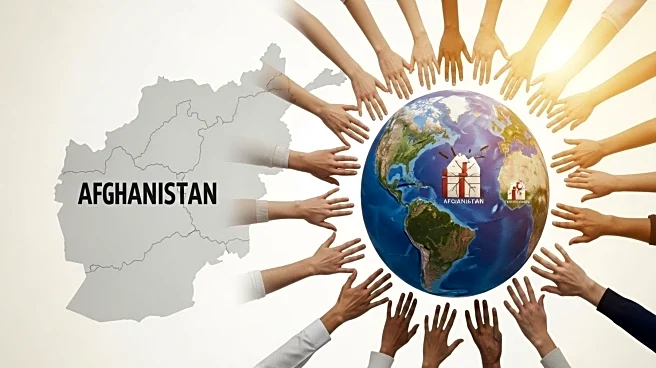What's Happening?
A 6.0 magnitude earthquake struck eastern Afghanistan on September 1, 2025, causing significant destruction and loss of life. The earthquake, which occurred near Jalalabad in Nangarhar Province, resulted in at least 800 fatalities and over 2,800 injuries. The quake's shallow depth of approximately 8 kilometers contributed to its destructiveness, leveling villages and causing widespread damage in the provinces of Kunar, Laghman, Nuristan, and Panjshir. The Taliban government has called for international assistance to aid in the relief efforts, as the country grapples with the aftermath of the disaster amidst ongoing challenges such as food shortages and reduced foreign aid. The earthquake is the third major seismic event to hit Afghanistan since 2021, further exacerbating the country's humanitarian crisis.
Why It's Important?
The earthquake's impact is significant due to Afghanistan's existing vulnerabilities, including poverty, conflict, and a reduction in international aid following the Taliban's takeover in 2021. The disaster has strained the country's limited resources, highlighting the urgent need for international support. The reduction in global aid, from $3.8 billion in 2022 to $767 million in 2025, has hampered relief efforts, making it difficult to reach affected areas. The situation underscores the broader humanitarian challenges facing Afghanistan, as the country struggles to recover from both natural and man-made disasters. The international community's response will be crucial in addressing the immediate needs of the affected population and supporting long-term recovery efforts.
What's Next?
The Taliban's appeal for international aid has seen some response, with the UK pledging £1 million in emergency funding and India providing tents and food aid. However, the scale of the disaster requires a more substantial global response. The international community's willingness to engage with the Taliban government and provide necessary aid will be critical in the coming weeks. The situation may also prompt discussions on the broader geopolitical implications of aid distribution in Afghanistan, as countries navigate the complexities of providing assistance under the current regime. The effectiveness of the relief efforts will depend on the coordination between international aid organizations and the Taliban government.
Beyond the Headlines
The earthquake highlights the ethical and logistical challenges of delivering aid in a politically complex environment. The international community faces a dilemma in balancing humanitarian needs with political considerations regarding the Taliban regime. The disaster may also prompt a reevaluation of aid strategies and the importance of building resilient infrastructure in earthquake-prone regions. Long-term, the event could influence international policies on disaster preparedness and response in conflict-affected areas, emphasizing the need for sustainable development and risk reduction measures.










